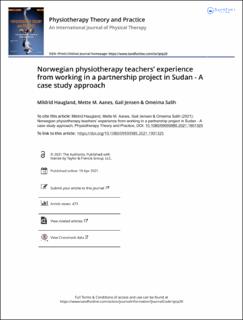Norwegian physiotherapy teachers’ experience from working in a partnership project in Sudan - A case study approach
Journal article, Peer reviewed
Published version

Åpne
Permanent lenke
https://hdl.handle.net/11250/2838926Utgivelsesdato
2021Metadata
Vis full innførselSamlinger
Sammendrag
Introduction and Aims: Professionals working abroad as part of a partnership program is a central act of internationalization among higher education institutions. Little research has been carried out on this topic. The goal of this study was, therefore, to explore, describe and discuss the workplace learning factors – especially cultural factors – influencing Norwegian physiotherapy teachers, working in an international partnership project at a women’s university in Sudan. Methods: The study had a qualitative case-study design, intended to provide an in-depth understanding of workplace learning processes. We used a multifaceted approach which included individual interviews and document analyses. Results: We identified individual, social and institutional factors that influenced workplace learning. Culture is decisive at all levels, and knowledge, skills and attitudes are culturally situated. The Norwegian teachers’ learning was found to be dependent on both internal and external factors and the pre- and post-project periods. Conclusion: This study shows that a workplace perspective on the experience of Norwegian physiotherapy teachers gives us a better understanding of the important factors, associated with such a project. Working abroad not only requires preparation on the part of the sending and host institution but also from the person working abroad (prior to, during and after the stay abroad) if workplace learning is to occur.
